Write Us
We are just a call away
[ LET’S TALK AI ]
X
Discover AI-
Powered Solutions
Get ready to explore cutting-edge AI technologies that can transform your workflow!

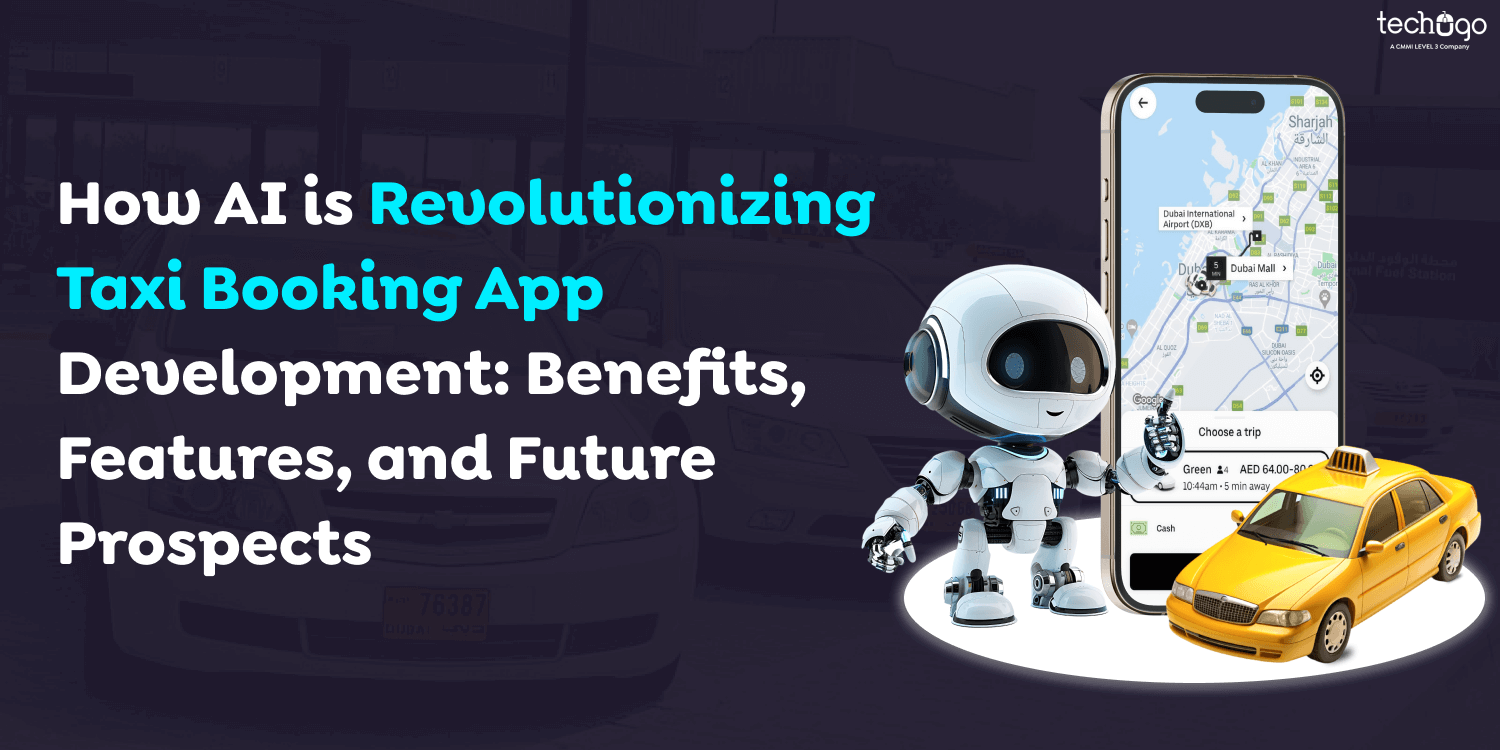
Today, AI has a major role to play in the development of mobile apps. This cutting-edge technology allows mobile app developers to develop innovative applications and enhances the service offered. AI is commonly used in the transport industry to speed up complex and lengthy procedures. Study results indicated that the taxi app market could reach $283 billion by 2028, with an expected compound annual growth rate (CAGR) between 2024 and 2028 of 4.2%.
Incorporating AI for taxi booking applications is more than just a new technology. It’s an effort to stay at the cutting edge of technological advancements, ensuring that the services are at the forefront of reliability, effectiveness, and customer-focused in an ever-changing market. The most modern taxi apps use technologies like AI to keep users up-to-date and flexible.
Today, AI-Powered Taxi App Development provides new possibilities for service providers to connect with and maintain clients. AI is a bridge between the two, making handling and facilitating various business tasks and understanding human behavior more straightforward. Suppose you operate an online taxi service and are looking for efficient operation. In that case, this blog is suitable for you.
Artificial Intelligence has been harnessed by established and new businesses and startups in the transportation field to build intelligent systems within the ride-hailing industry. A notable example is the introduction of a taxi dispatch driven by an AI system that is transforming the business by increasing efficiency while improving the user experience.
The software equips drivers with information and gives their suggestions on the most effective ways to find customers and reduce passenger waiting times. It also increases drivers’ earnings, which benefits both sides. AI integration into the transportation field is an innovation that will take the ride-hailing industry to new heights.
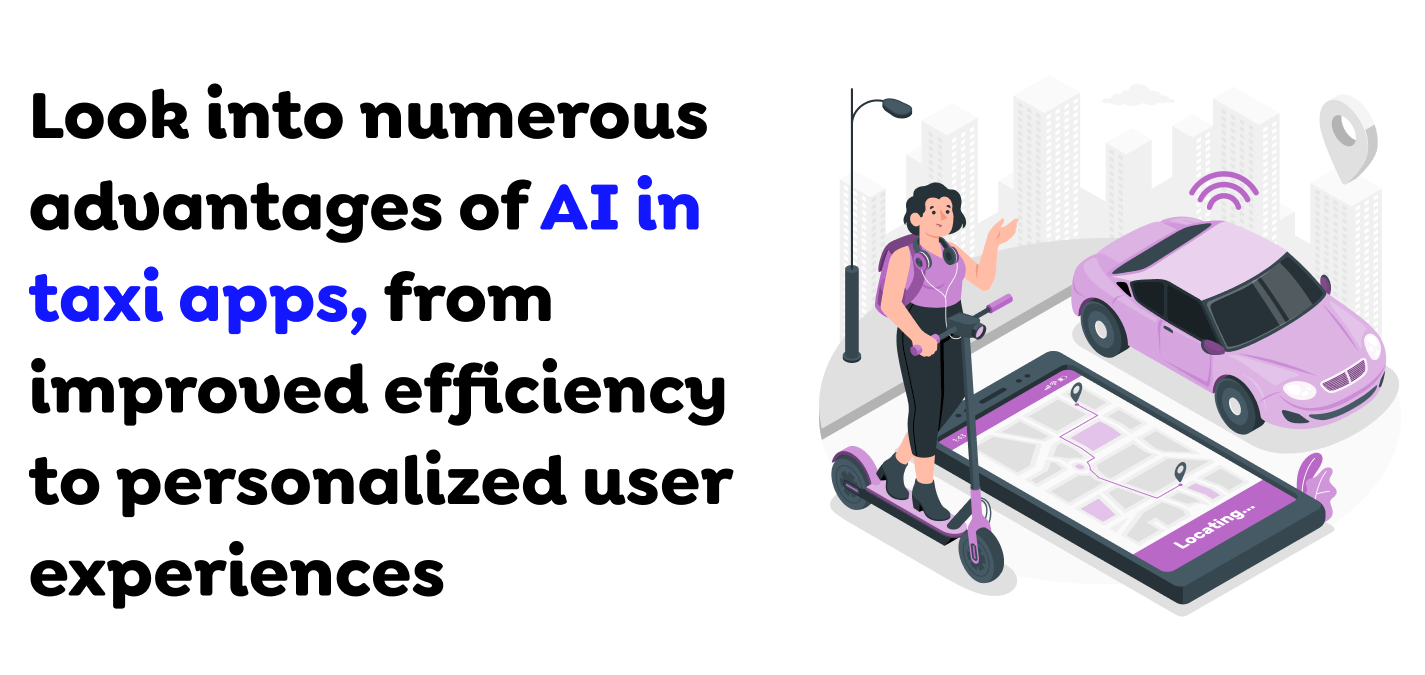
Launching apps for taxis in the USA, UK, Canada, and UAE unlocks new possibilities for transportation. The advantages are countless, from increased efficiency to a better user experience.
Also Read : Flying Taxis Dubai: Aerial Vehicles Are Arriving to Reform the Worldwide Travel Experience
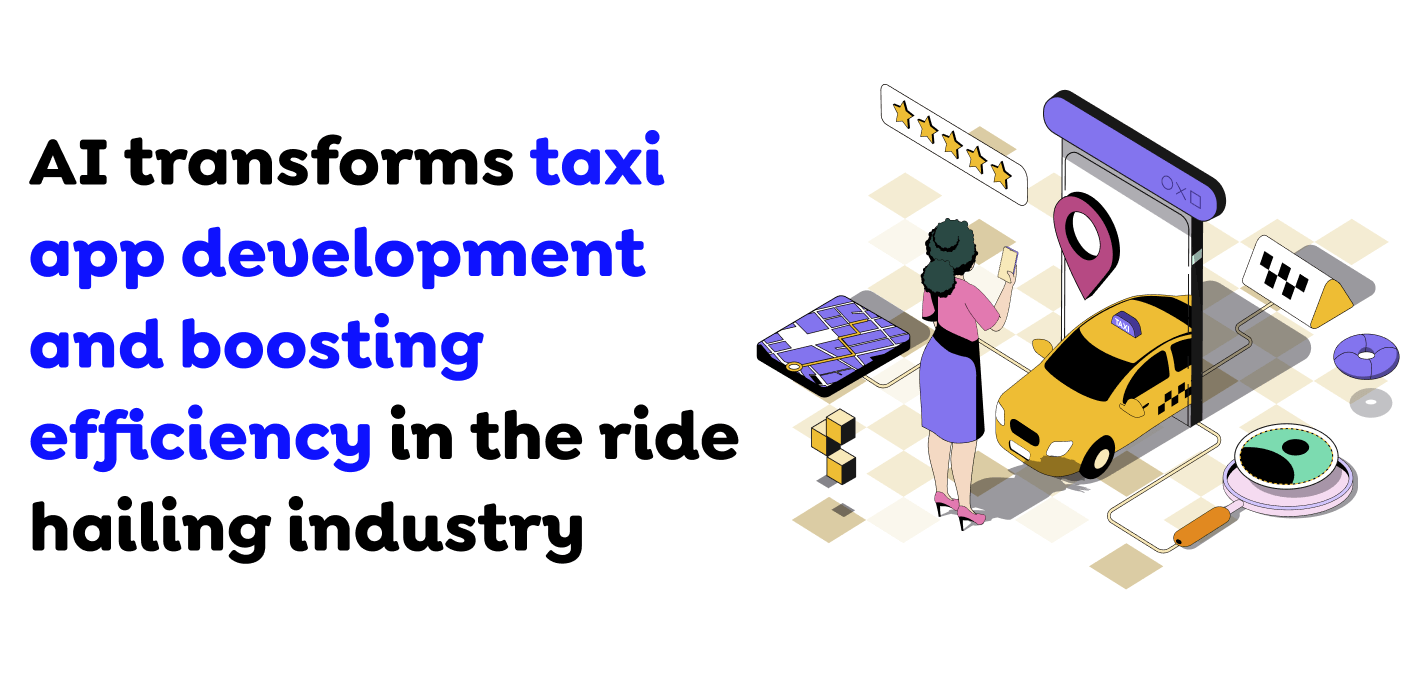
Artificial Intelligence (AI) encompasses the full spectrum of technological advances, including ML, natural language processing, computer vision, and robotics. Regarding taxi booking applications, AI can process vast amounts of data to make intelligent choices, anticipate user behavior, improve routes, increase security, and more. This section will examine how AI integrates into the various aspects of developing Taxi Booking App.
Predictive analysis assists in predicting the needs of users before inquiring. AI models can determine when customers are most likely to take a taxi in their routines. They can suggest taking advantage of a cab booking in advance. This is not just a boost to users’ convenience. Still, it also assists in better fleet management by anticipating demand patterns.
Mobile apps that operate in different areas and use real-time AI translation could eliminate the language barrier. Natural Language Processing (NLP) allows the application to comprehend and answer user questions in various languages, making it accessible to an international audience.
AI-driven voice-activated commands allow users to make ride reservations, switch directions, or even get notifications without typing. The hands-free user experience benefits people on the move or handicapped, increasing the number of users who use the app.
Also Read : Voice Search Technology: Significant Impact on Mobile App Development!
The taxi app that includes AI excels at optimizing routes so drivers can take passengers to their destinations at the most efficient speed. Artificial Intelligence implements the reasoning algorithm that creates a precise route for the driver.
The drivers can receive calls according to the time of day and in which direction. If, for instance, the driver is located near point C, AI algorithms will ensure they receive only booking requests from places close to location C. AI-powered taxi app development could do amazing things!
Self-dispatch occurs when a taxi can reach any person in need as soon as possible without their boss’s intervention. This term has become synonymous with traditional taxi service. Because AI capabilities can be utilized for data mining and pattern recognition, they can aid your taxi company in mobilizing resources efficiently.
Self-directed dispatch can automatically message the driver to pick up the nearest customer who’s made an appointment. This improves the reliability of taxi services and provides seamless service for clients.
Today’s consumers do not prefer to be treated like robots. They are more inclined to do business with companies that emphasize personalization. Customers of the ride-hailing industry are not the only ones. Use AI’s capabilities for your taxi mobile application development to understand your customers’ needs better.
Check out eCommerce sites and write that your clients have previously taken journeys with them. Be aware of their habit of making taxi reservations or ride lengths and their most frequently visited destinations, as these are valuable indicators to research. So, you can personalize your push notifications for mobile devices and encourage the users to taxi when they typically avail a discount or coupon for a limited time once they’ve taken X amount of trips with the company. AI helps you to improve the taxi service you offer to these customers.
The degree of automation and user-friendliness that Artificial Intelligence app Services can enable for taxi apps is awe-inspiring. What’s impressive is how it allows operators to develop and provide a smooth process for passengers to board.
To begin with, AI can be integrated into chatbots that provide answers to drivers’ frequently asked questions. Furthermore, AI-powered modules for training provide real-time assistance for drivers with problems with their taxi application. Simply handing over drivers to an app for taxis that has AI will not suffice.
There is no way to guarantee that drivers will feel comfortable with the new technology. So, implementing an onboarding process could help your taxi company appear more empathetic to your drivers. This could, in turn, help expand your taxi business through word-of-mouth.
One of the USPs of AI is the ability to analyze sentiment, allowing you to know where it is, what time, and when your Dubai Taxi App has been debated among your customers and competitors. These interactions can occur through social media channels, message boards, or online forums. Whatever the medium, the user can get actionable insight into how the marketplace perceives your taxi app and use user feedback to increase your product offering, change user policies, and add new features.
Artificial intelligence tool-powered models for dynamic pricing adjust prices based on the latest information, such as road conditions and the available drivers. This guarantees fair pricing, increases drivers’ earnings, and balances demand and supply efficiently. Customers benefit from better service availability, and drivers are paid a fair amount in proportion to the services they offer in various situations.
AI assists in more efficient fleet management by anticipating maintenance requirements, coordinating drivers’ schedules, and optimizing vehicles’ locations based on demand forecasts. This method of proactive management minimizes downtime, improves vehicle longevity, and assures efficient operation, which is essential to maintaining the quality of service.
AI can monitor driving behavior by analyzing data collected from cameras and sensors inside the vehicle. It will be able to identify risky behaviors like harsh braking, fast acceleration, and distracted driving. In real-time, alerts and feedback could be given to drivers to promote safer driving practices and decrease the chance of accidents.
AI-powered facial recognition, powered by AI and behavioral analysis, improves the safety of passengers. In particular, it will verify the driver’s identity before departure and look for unusual behavior during the ride. Emergency response buttons and panic mechanisms are also triggered in a sequence if the AI detects any dangers.
AI will help identify and deter fraudulent activity, including fake bookings, fraudulent payment transactions, and identity theft. Machine learning algorithms look for patterns and anomalies within transactions to detect suspicious activity and flag it for further investigation.
Incorporating AI into autonomous vehicles is among the most revolutionary innovations in taxi services. AI allows self-driving cars to explore complex areas, identify obstacles, and make instant choices. Companies are on the cutting edge of this new technology, which is expected to transform taxi service by eliminating the demand to employ human drivers and possibly cutting expenses.
Artificially-driven chatbots and virtual assistants can quickly manage many client inquiries. They can answer most common queries immediately, assist in booking problems, and even escalate more complex issues to human support agents. This increases the efficiency of customer service and assures users get prompt assistance.
AI provides valuable insight into customer behavior, market trends, and operational efficiency. Analytics help organizations make informed decisions about expanding into new markets, offering new services, or upgrading existing offerings. Data-driven decisions increase competition and ensure constant growth.
Also Read : Ride Sharing App Development: A Gateway to Enhance Travel & Tourism Industry
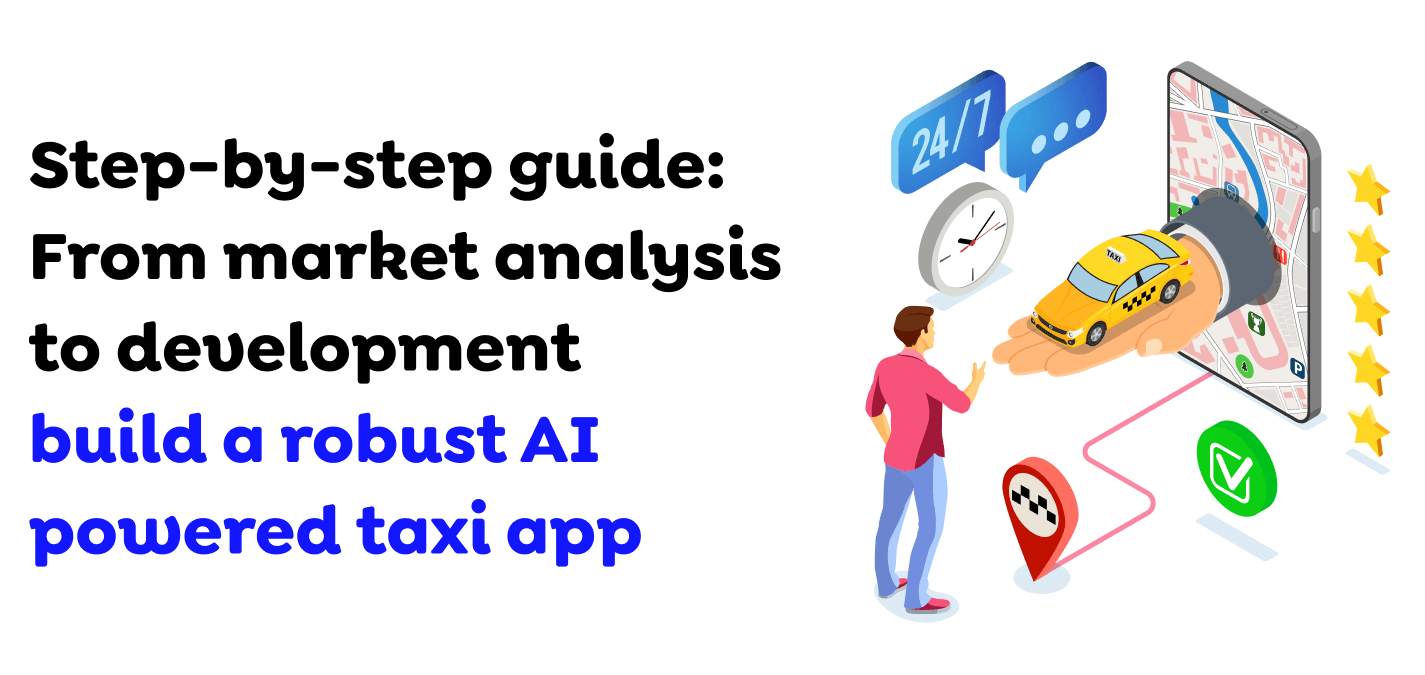
Creating a taxi app that is in tune with the user’s requirements and stands against the tests of time takes an organized approach. Below is the process the Mobile App Development Company In UAE follows for creating the taxi booking application.
The first step is to conduct a comprehensive investigation of the market to comprehend users’ needs and to identify and fill in any gaps in the market. The process involves analyzing competitors’ offerings, market trends, and user reviews. For this, you can use surveys, focus groups, and tools for competitor analysis to gather information.
Following analysis and research, create a UVP that addresses unsatisfactory needs and provides more effective solutions than currently accessible. The range of options can range from offering low-cost services to offering luxurious services or targeting specific markets, such as environmentally friendly transportation or carpooling.
Develop prototypes that can enhance the actual app user experience. Software such as Adobe XD or Figma helps create interactive prototypes that provide an excellent opportunity for user testing. Gather feedback from prospective users and refine the concept before moving into the design stage.
It’s not all about aesthetics. It’s all about creating an enjoyable user experience. So, concentrate on streamlining the process, beginning with the application and making a reservation for a ride. It is about creating a coherent process, eliminating the need to make a reservation, and ensuring that you follow the rules for special-ability commuters.
An agile strategy will ensure transparency throughout the process’s conclusion. In this case, the project is split into short-term sprints that concentrate on specific functions, promoting flexibility, quicker time to market, and frequent improvements based on feedback. Selecting the appropriate technology stack can ensure flexibility, security, and cross-platform compatibility. Flutter, for example, allows cross-platform development, and Node.js provides a dynamic backend system.
Conduct thorough testing, including user acceptance (UAT) tests and unit tests, to ensure the app is safe, secure, and easy to use. Examine the app under various network conditions and on different devices.
Develop an app integrated marketing plan, including social media promotion, targeted advertisements, and user-generated content marketing. Additionally, you could consider creating a referral program to encourage current users to share their acquaintances. It’s the latest buzzword, particularly when discussing the app’s success.
Before launching your app, you should optimize the list of these stores by using compelling keywords, images, and long and short descriptions to increase exposure and the number of organic users. When you have launched the app, review user feedback and indicators of app performance. Initial feedback from users helps identify issues or address user requirements.
Reach out to the app development firm to leverage user feedback and performance data to improve continuously. The priority of updates should be based on customer needs and the strategic significance of the features and functions.
With a growing number of users, increasing the size of your app’s infrastructure is necessary to maintain its performance. This means improving your database, increasing the capacity of your servers, or creating an efficient application. Think about expanding geographically and adding more options to your database when it develops. Also, be sure to be aware of regional needs and preferences.
Also Read : How Much Does it Cost to Create a Mobile App in Dubai in 2024?
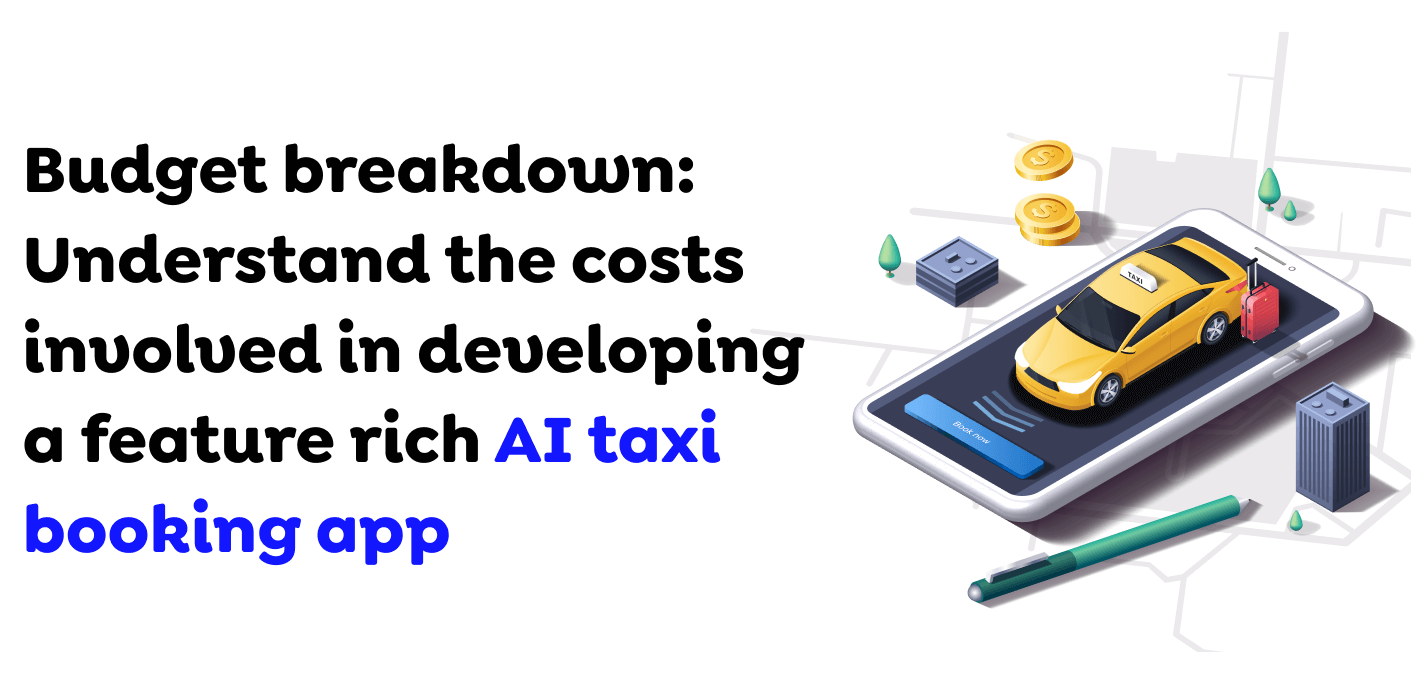
You must know the possible costs when creating an app to book taxis for your company. The Cost To Develop a Mobile App can differ depending on the capabilities and features you’d like to incorporate. Various aspects, such as the complexity of your app, platforms (Android and iOS, as well as both), the size of your operation, the tech stack you use, and the developer’s geographical location, will affect the final taxi app’s development costs.
Here’s a cost breakdown:
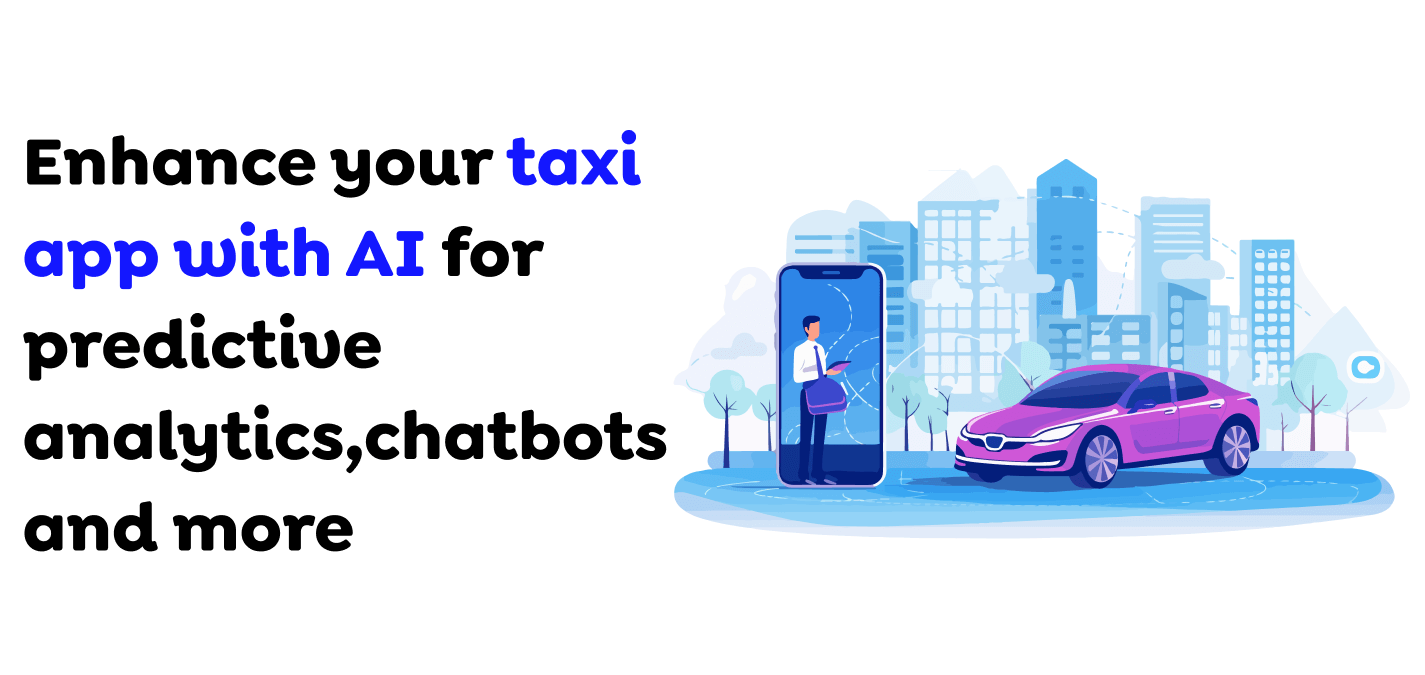
AI-powered ride-hailing applications could significantly improve customer experience and boost your company’s efficiency by enhancing security, efficiency, and satisfaction. Below are some methods to incorporate AI in the taxi booking application you use:
Predictive analytics rely on historical data and machine-learning models to accurately forecast areas of high demand and the peak hours for taxis. This allows drivers to plan their routes and move themselves to reduce the time it takes to wait for passengers.
AI-powered ride-hailing apps allow for considering the real-time flow of traffic closings on roads and different conditions to determine the most effective routes for drivers. This is not just time-saving but also lowers the cost of fuel.
Mobile App Development Company In Saudi Arabia seamlessly integrates chatbots and virtual assistants for immediate customer service, addresses the most common questions, assists with bookings, and keeps customers informed with ride information for better service.
Use AI algorithms that match passengers’ demands with the nearest drivers to ensure quick pick-ups and optimize fleet management to increase effectiveness.
AI is able to predict ETAs with greater precision through factors such as weather, traffic congestion, and driver availability. It ensures that travelers know their expectations and prepare their journeys accordingly.
In real-time, on-demand taxi companies can use a dynamic pricing algorithm to alter fares based on demand and supply. This helps them keep track of the available drivers and passengers at peak times.
Incorporate AI-driven safety functions, such as driver behavior monitoring and passenger authentication, to increase the application’s security.
Allow voice recognition for booking or performing other actions via your app, making the experience more user-friendly and user-friendly. This feature should add convenience and user-friendliness.
AI-driven payment gateway processing speeds up transactions, increases security, prevents fraud, and provides users with various payment options. It makes payments more efficient.
If your business online is available in several regions, Utilize AI to provide real-time translation of languages. This will facilitate effective communication between passengers and drivers, providing a better and more accommodating experience.
Also Read : Revolutionise Air Travel with Aviation Software App Development in 2024!
Transportation has undergone an enormous transformation due to the advent of taxi companies based on platforms and using technology such as artificial Intelligence (AI). Today, we’re eager to understand the business model that makes money from AI-powered taxis and reveal the ways these platforms have transformed the transportation industry.
A platform-based model for taxi services includes developing a platform to connect riders with drivers. Through AI technology, such platforms can improve the process of matching, forecast the patterns of demand, give individualized recommendations, and improve security precautions. The model gives riders and drivers the flexibility to scale and ease of use. This is a revolutionary advancement that is shaping the future of transportation.
AI algorithms evaluate various aspects, such as the availability of the location and customers’ preferences, to connect riders to the most appropriate drivers. This ensures a seamless and fast match-making process.
AI algorithms can also provide dynamic pricing that adjusts rates based on demand, supply, and traffic situations. This assists in balancing demand and supply, encouraging greater availability of drivers at peak times, and providing reasonable pricing for passengers and drivers.
In addition, when there is a surge mechanism, a pricing mechanism can be put in place when there is a high demand. AI algorithms analyze real-time data to detect areas experiencing a surge and then adjust prices accordingly. The result is that more drivers will remain in the regions, ensuring prompt service for passengers.
AI algorithms can optimize routing planning, driver allocation, and routing, leading to shorter wait times and faster journeys. This increases the general quality of the service and the customer’s overall satisfaction.
AI can provide personalized recommendations that are based on data from the past, including favorite locations or routes that you prefer. It tailors the experience according to the individual’s preferences and increases the satisfaction of customers.
Taxi service with AI includes safety measures such as driver background checks, real time updates, GPS tracking, and SOS features. AI algorithms can also look for patterns and identify patterns or changes in the routes used to assure customers of the safety and security of their journey.
Also Read : What is the cost to build a mobile app in the UAE?
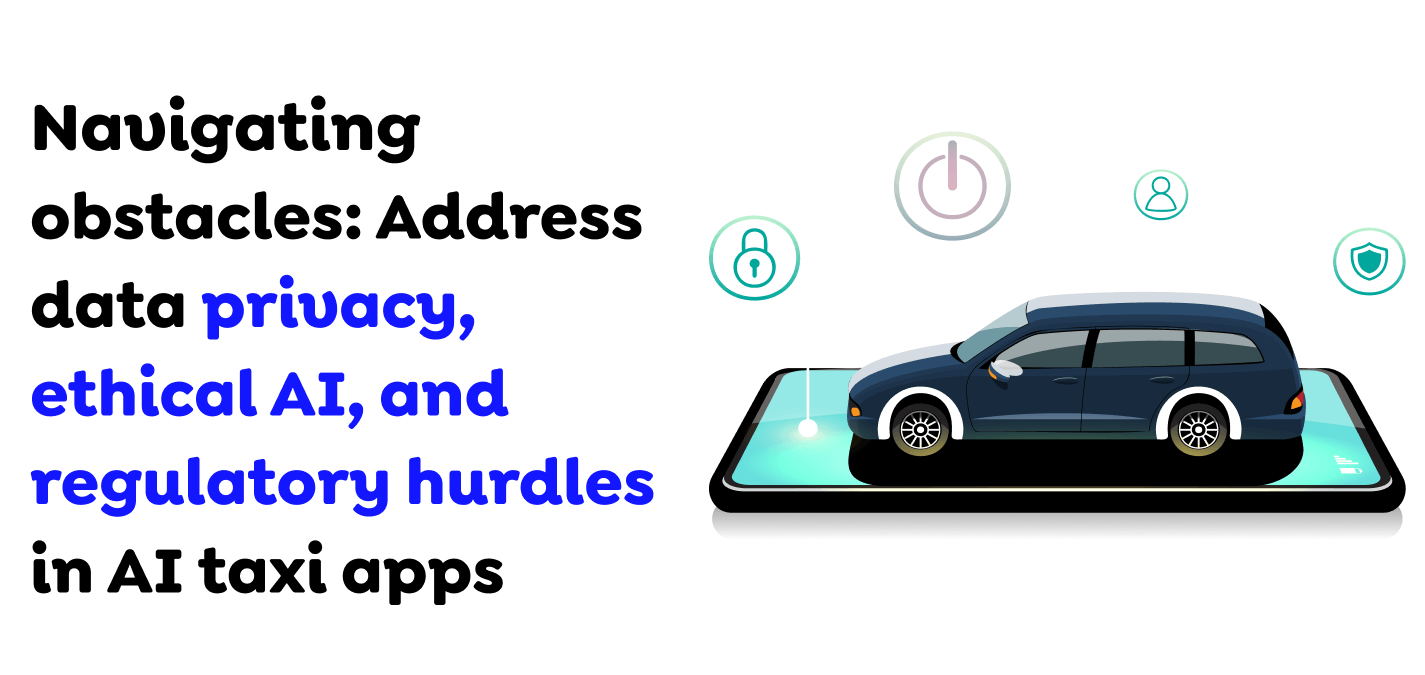
Here are a few of the most significant challenges associated with AI-powered taxi apps:
The application of AI for taxi booking apps includes analyzing and collecting massive amounts of information from users. Ensuring data privacy is protected and compliance with regulations like GDPR is essential. Enterprises must have strong data protection policies and provide transparency about what data users are taking, storing, and utilizing.
Ethical concerns should guide the use of AI algorithms. It is important to ensure the fairness of AI, eliminate biases from AI algorithms, and make AI decisions clear and easy to understand. Morally sound AI techniques are vital to creating trust among users and ensuring an ethical use of technology.
Implementing the latest AI techniques, including autonomous cars, is facing major challenges in technology and regulation. These include ensuring the security and safety of AI devices, obtaining regulatory approvals, and responding to public concerns regarding the use of AI in transportation. Industry players and regulatory authorities must collaborate to overcome these obstacles.
Also Read : VPN App Development: A Comprehensive Guide to Securing Your Digital Footprint
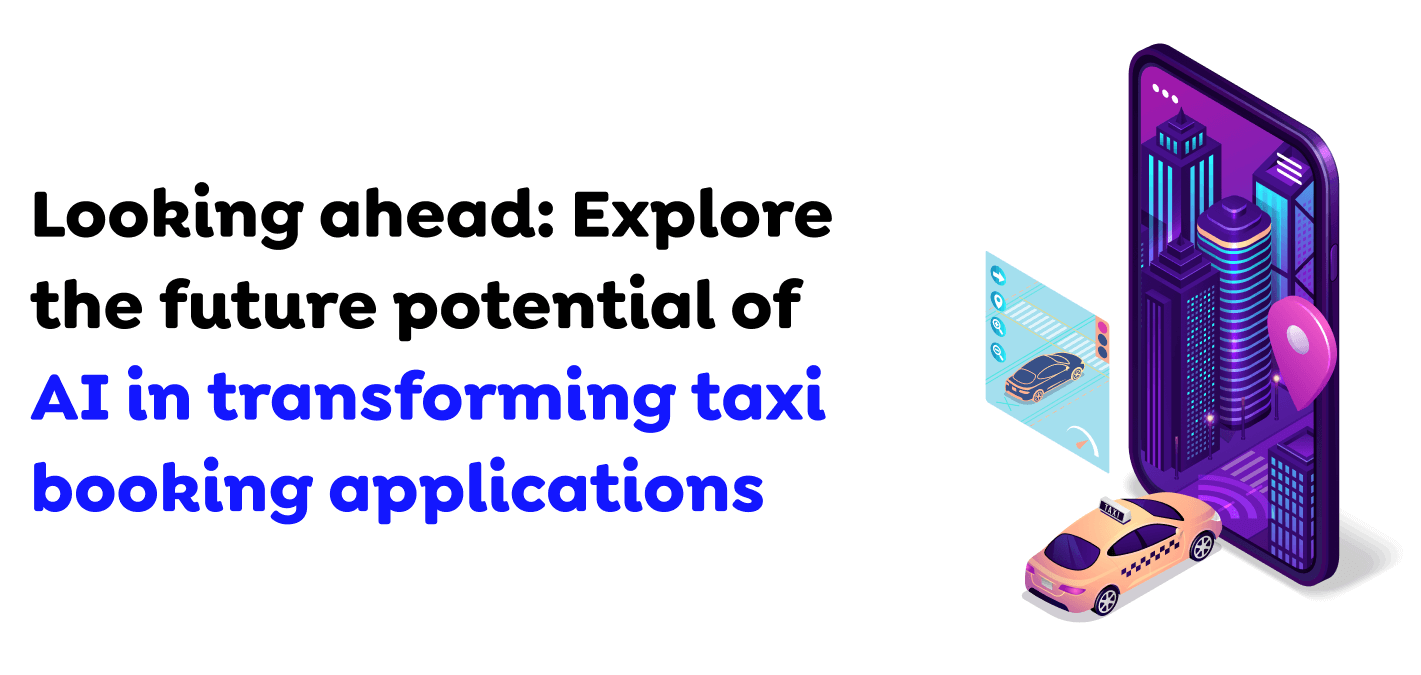
Let’s take a look at what the future holds for AI in taxi Mobile App Development In Dubai.
The future of AI in taxi booking applications will be in fully autonomous taxis. Issues with the technology and regulations still need to be solved. Still, the rapid advancement in autonomous technology means full-autonomy taxis could take off in the coming decade. This change will profoundly alter the taxi industry, cutting costs and possibly increasing accessibility.
As AI algorithms advance and become more capable, their ability to forecast the demand for taxi-booking applications will expand accordingly. This will allow for more precise demand forecasting, dynamic pricing adjustments, and personalized user experience. The improved predictive analytics will result in more efficient operation and higher user satisfaction.
Integrating AI-powered booking services with the city’s smart infrastructure allows seamless mobility in urban areas. Real-time information from multiple sources, such as traffic signals, public transportation systems, and road sensors, is incorporated to enhance route planning and lessen traffic congestion. This comprehensive approach can contribute to more environmentally sustainable and effective urban transportation networks.
Combining AI and blockchain technology could increase security, transparency, and confidence in taxi booking applications. Blockchain technology can create an uncentralized ledger to track transactions and verify identity. AI will analyze these data to spot fraudulent transactions and streamline the efficiency of operations. The synergy can tackle some of the significant issues in taxis, including data security and reliability.
Also Read : What Does It Cost to Create A Text-to-Video AI Platform Like SORA?
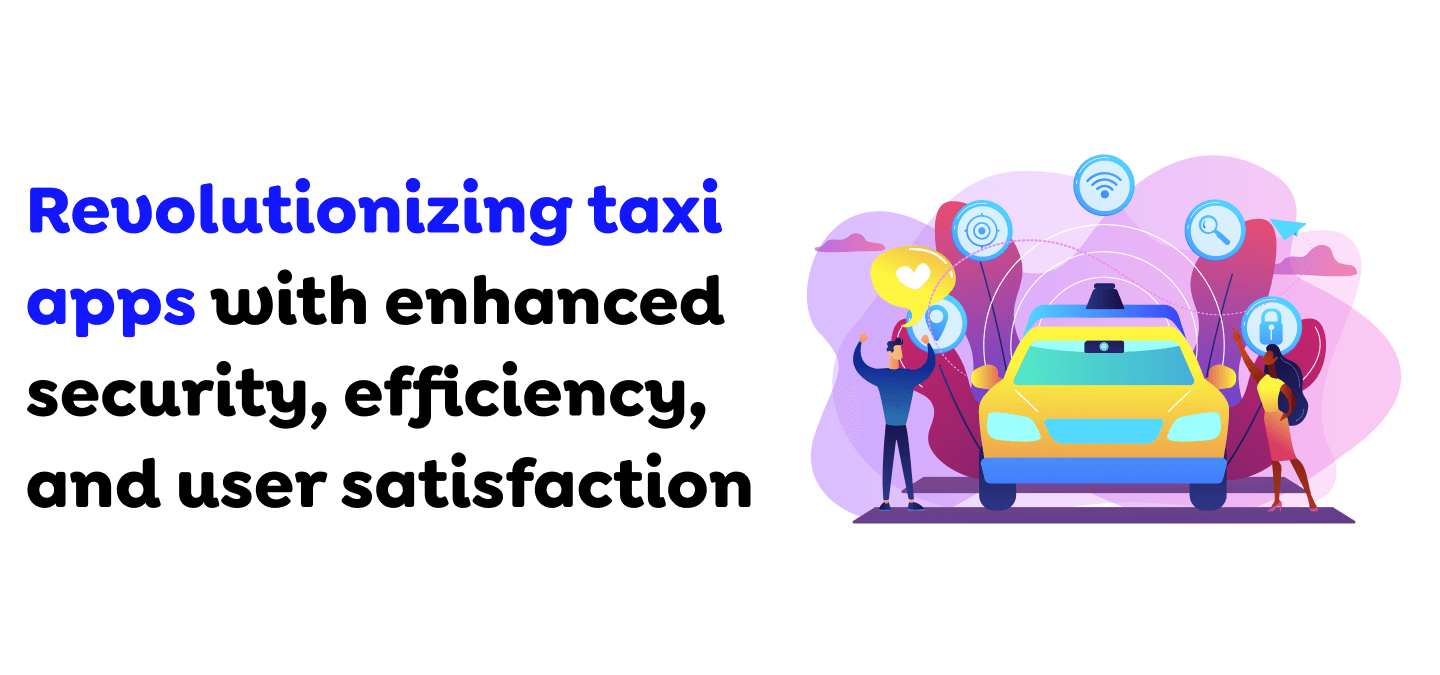
AI transforms taxi booking apps by increasing creativity, streamlining processes, increasing safety, and improving the overall experience. From personalized recommendations to predictive analysis to autonomous vehicles and sophisticated customer service, AI technologies are revolutionizing all aspects of taxi service. As AI develops shortly, it will provide AI App Development Company more significant opportunities to incorporate AI for taxi booking applications. The apps that promise a better, safer, user-friendly, and secure transportation system.
Entrepreneurs in the early stages and those intrigued by the latest technology should look into creating AI-powered taxi booking software. AI has magnificently transformed the market for ride-hailing, enhancing users’ experience by providing features such as enhanced security, precise ETA forecasting, and numerous payment choices. The advancements in AI have created many opportunities to tap into a lucrative market that benefits operators, passengers, and drivers.
Get in touch with our team to know more about Artificial Intelligence!
Write Us
sales@techugo.comOr fill this form